中考英语全国通用版二轮专项复习动词(共47张PPT)
文档属性
| 名称 | 中考英语全国通用版二轮专项复习动词(共47张PPT) |
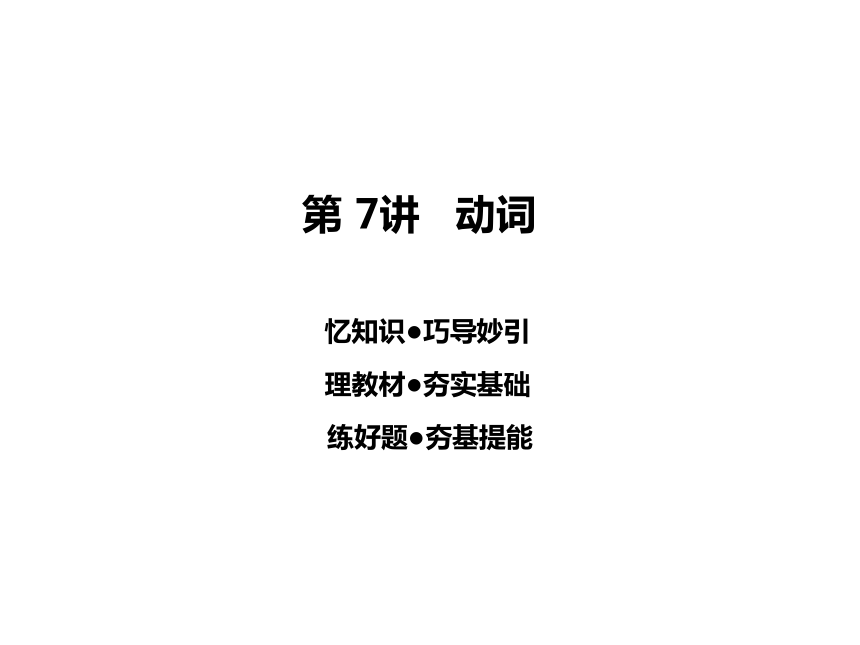
|
|
| 格式 | pptx | ||
| 文件大小 | 838.1KB | ||
| 资源类型 | 教案 | ||
| 版本资源 | 通用版 | ||
| 科目 | 英语 | ||
| 更新时间 | 2023-06-22 21:35:12 | ||
图片预览

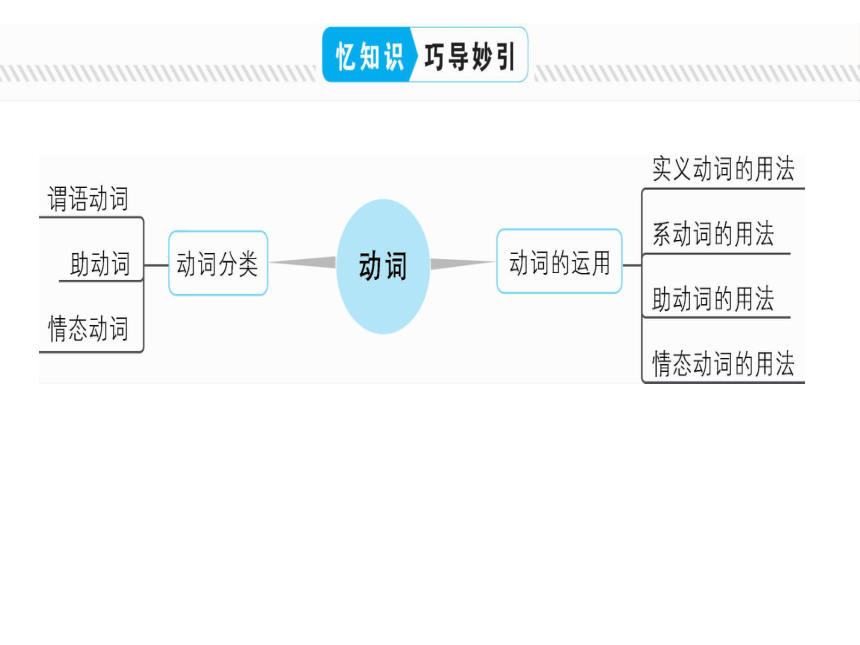
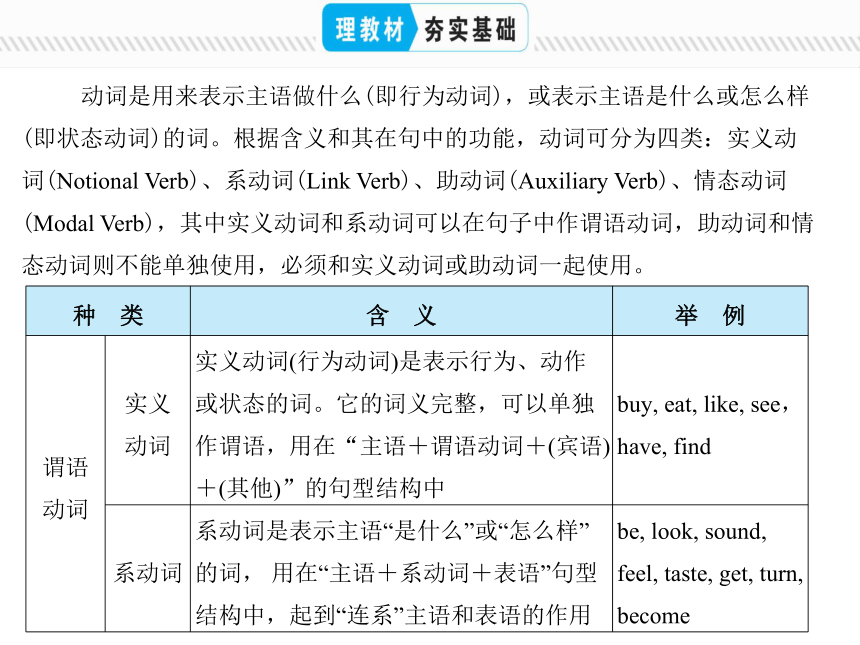
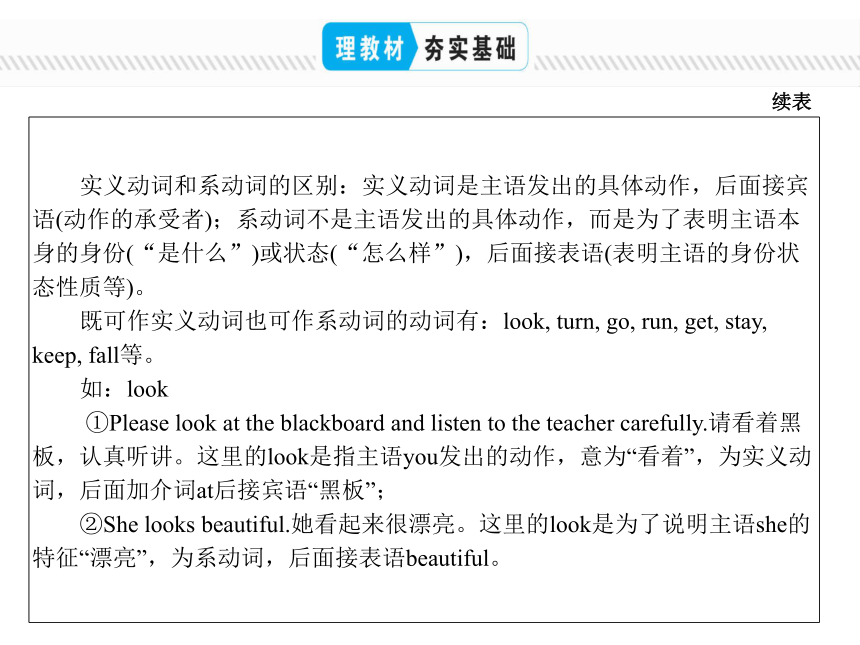
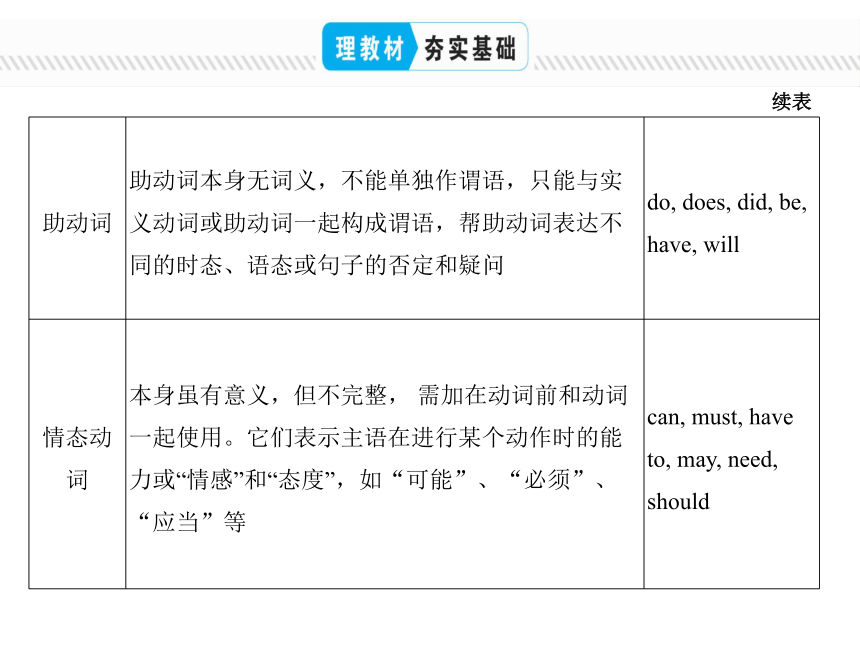
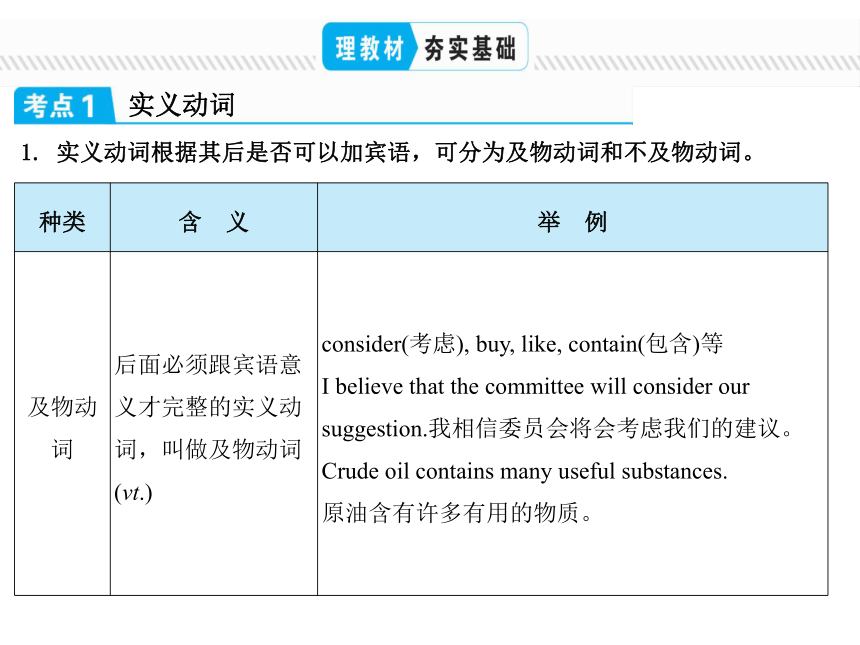
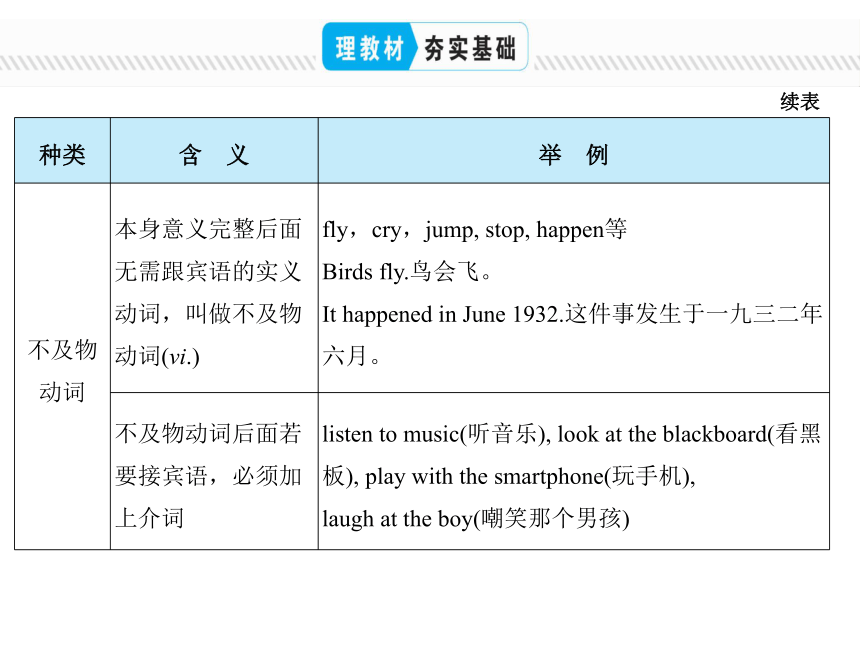
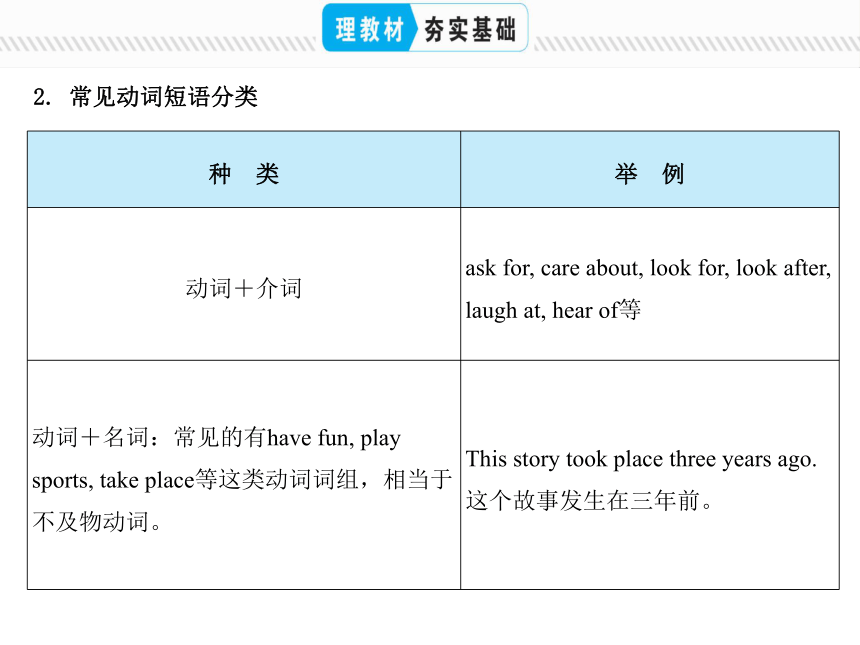
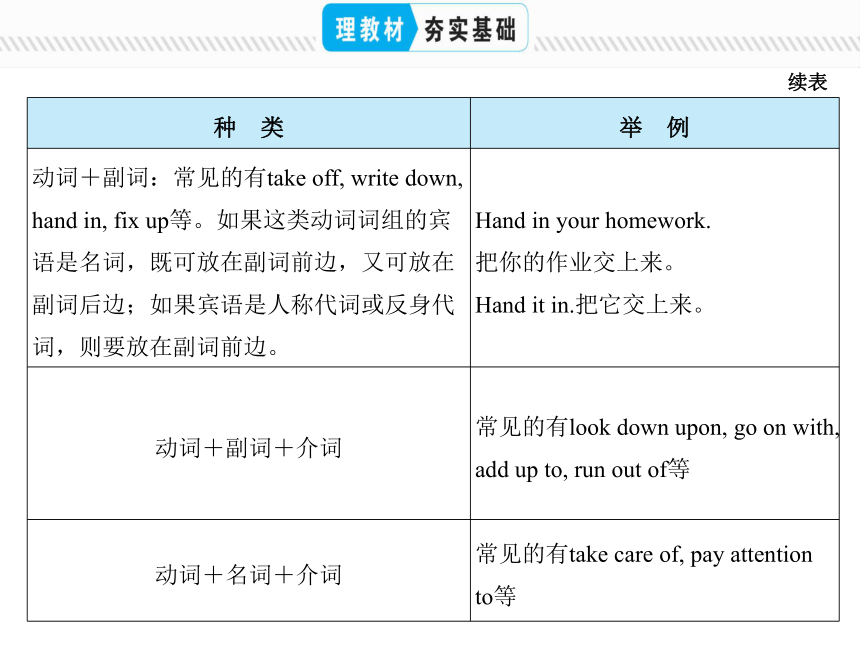
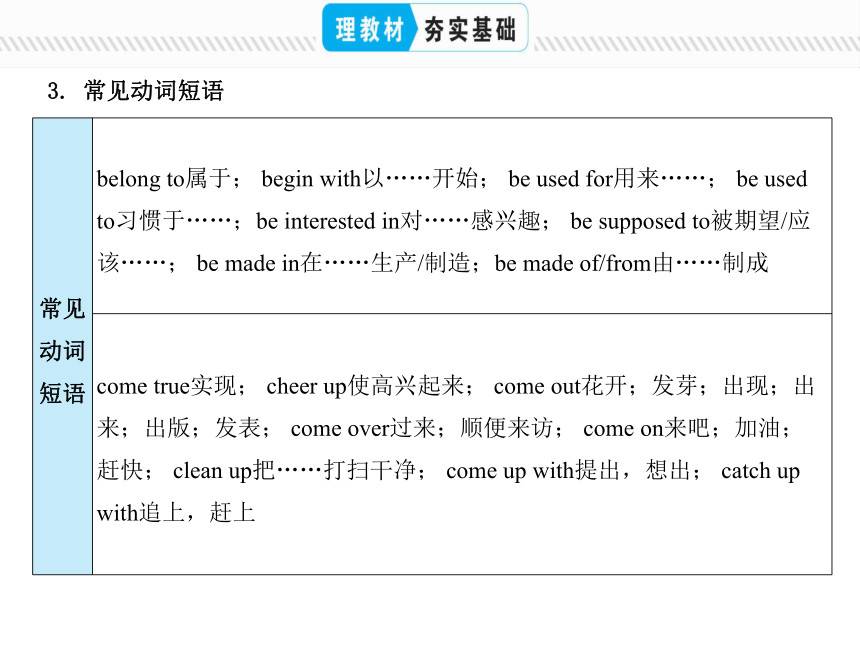
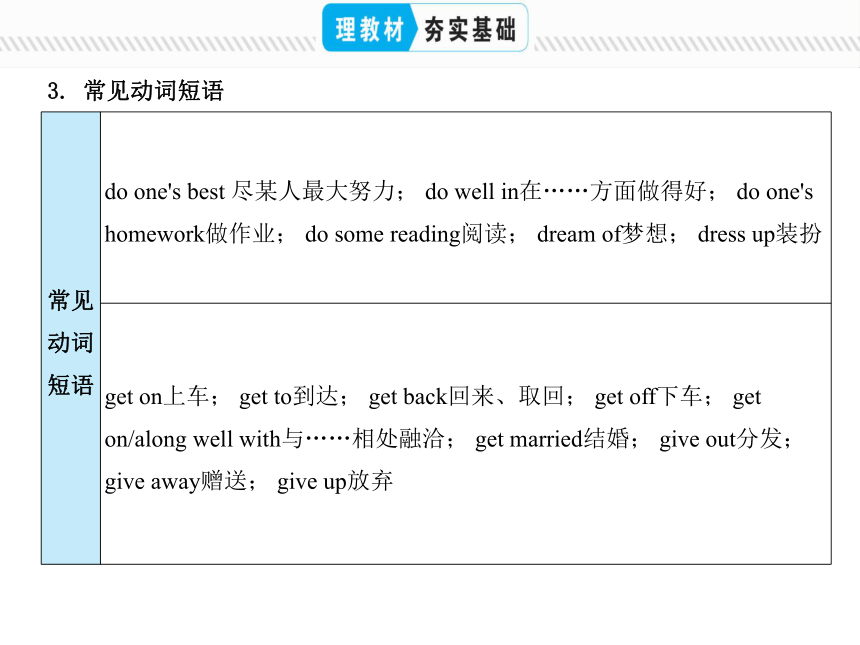
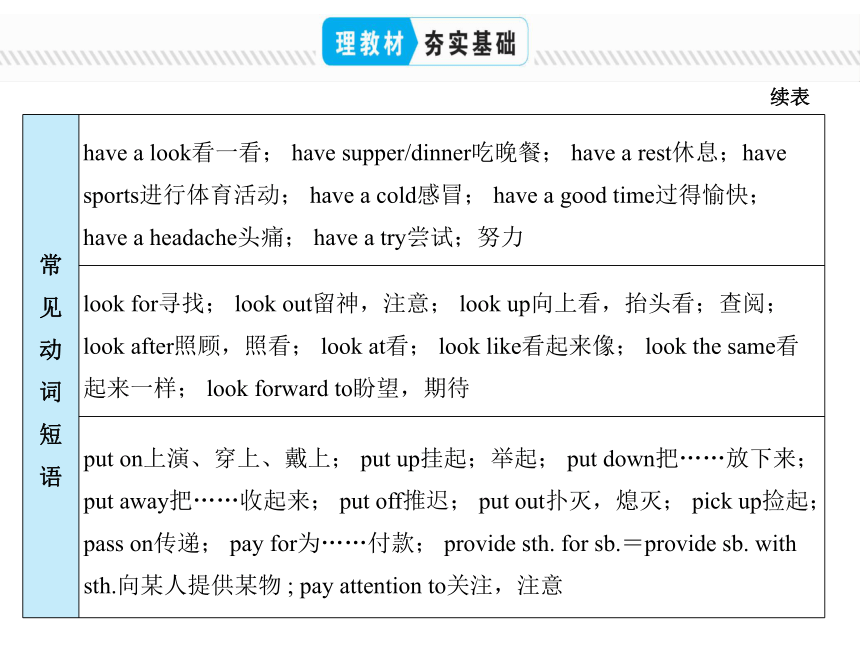
文档简介
(共47张PPT)
第 7讲 动词
忆知识●巧导妙引
理教材●夯实基础
练好题●夯基提能
动词是用来表示主语做什么(即行为动词),或表示主语是什么或怎么样(即状态动词)的词。根据含义和其在句中的功能,动词可分为四类:实义动词(Notional Verb)、系动词(Link Verb)、助动词(Auxiliary Verb)、情态动词(Modal Verb),其中实义动词和系动词可以在句子中作谓语动词,助动词和情态动词则不能单独使用,必须和实义动词或助动词一起使用。
种 类 含 义 举 例
谓语 动词 实义 动词 实义动词(行为动词)是表示行为、动作或状态的词。它的词义完整,可以单独作谓语,用在“主语+谓语动词+(宾语)+(其他)”的句型结构中 buy, eat, like, see,have, find
系动词 系动词是表示主语“是什么”或“怎么样”的词, 用在“主语+系动词+表语”句型结构中,起到“连系”主语和表语的作用 be, look, sound, feel, taste, get, turn, become
实义动词和系动词的区别:实义动词是主语发出的具体动作,后面接宾语(动作的承受者);系动词不是主语发出的具体动作,而是为了表明主语本身的身份(“是什么”)或状态(“怎么样”),后面接表语(表明主语的身份状态性质等)。
既可作实义动词也可作系动词的动词有:look, turn, go, run, get, stay, keep, fall等。
如:look
①Please look at the blackboard and listen to the teacher carefully.请看着黑板,认真听讲。这里的look是指主语you发出的动作,意为“看着”,为实义动词,后面加介词at后接宾语“黑板”;
②She looks beautiful.她看起来很漂亮。这里的look是为了说明主语she的特征“漂亮”,为系动词,后面接表语beautiful。
续表
助动词 助动词本身无词义,不能单独作谓语,只能与实义动词或助动词一起构成谓语,帮助动词表达不同的时态、语态或句子的否定和疑问 do, does, did, be, have, will
情态动词 本身虽有意义,但不完整, 需加在动词前和动词一起使用。它们表示主语在进行某个动作时的能力或“情感”和“态度”,如“可能”、“必须”、“应当”等 can, must, have to, may, need, should
续表
实义动词
种类 含 义 举 例
及物动词 后面必须跟宾语意义才完整的实义动词,叫做及物动词(vt.) consider(考虑), buy, like, contain(包含)等
I believe that the committee will consider our suggestion.我相信委员会将会考虑我们的建议。
Crude oil contains many useful substances.
原油含有许多有用的物质。
1. 实义动词根据其后是否可以加宾语,可分为及物动词和不及物动词。
种类 含 义 举 例
不及物 动词 本身意义完整后面无需跟宾语的实义动词,叫做不及物动词(vi.) fly,cry,jump, stop, happen等
Birds fly.鸟会飞。
It happened in June 1932.这件事发生于一九三二年六月。
不及物动词后面若要接宾语,必须加上介词 listen to music(听音乐), look at the blackboard(看黑板), play with the smartphone(玩手机),
laugh at the boy(嘲笑那个男孩)
续表
2. 常见动词短语分类
种 类 举 例
动词+介词 ask for, care about, look for, look after, laugh at, hear of等
动词+名词:常见的有have fun, play sports, take place等这类动词词组,相当于不及物动词。 This story took place three years ago.这个故事发生在三年前。
种 类 举 例
动词+副词:常见的有take off, write down, hand in, fix up等。如果这类动词词组的宾语是名词,既可放在副词前边,又可放在副词后边;如果宾语是人称代词或反身代词,则要放在副词前边。 Hand in your homework.
把你的作业交上来。
Hand it in.把它交上来。
动词+副词+介词 常见的有look down upon, go on with, add up to, run out of等
动词+名词+介词 常见的有take care of, pay attention to等
续表
3. 常见动词短语
常见 动词 短语 belong to属于; begin with以……开始; be used for用来……; be used to习惯于……;be interested in对……感兴趣; be supposed to被期望/应该……; be made in在……生产/制造;be made of/from由……制成
come true实现; cheer up使高兴起来; come out花开;发芽;出现;出来;出版;发表; come over过来;顺便来访; come on来吧;加油;赶快; clean up把……打扫干净; come up with提出,想出; catch up with追上,赶上
3. 常见动词短语
常见 动词 短语 do one's best 尽某人最大努力; do well in在……方面做得好; do one's homework做作业; do some reading阅读; dream of梦想; dress up装扮
get on上车; get to到达; get back回来、取回; get off下车; get on/along well with与……相处融洽; get married结婚; give out分发; give away赠送; give up放弃
续表
常见 动词 短语 have a look看一看; have supper/dinner吃晚餐; have a rest休息;have sports进行体育活动; have a cold感冒; have a good time过得愉快; have a headache头痛; have a try尝试;努力
look for寻找; look out留神,注意; look up向上看,抬头看;查阅; look after照顾,照看; look at看; look like看起来像; look the same看起来一样; look forward to盼望,期待
put on上演、穿上、戴上; put up挂起;举起; put down把……放下来;
put away把……收起来; put off推迟; put out扑灭,熄灭; pick up捡起;
pass on传递; pay for为……付款; provide sth. for sb.=provide sb. with sth.向某人提供某物 ; pay attention to关注,注意
续表
常见 动词 短语 take off脱掉、起飞; take photos照相; take out取出; take a seat坐下; take part in参加; take care of照顾,照料; take exercise做运动; take one's place坐某人的位置,代替某人的职务; take turns依次,轮流; talk about谈论; talk to/with和……交谈; turn on打开(电灯、收音机、煤气、自来水等); turn off关闭(电灯、收音机、煤气、自来水等); turn up调高(音量); turn down调低(音量)、拒绝;turn…over把……翻过来; think of认为、想起; think about考虑; take place 发生 ; take after与……相像
show sb. sth. 给某人看某物;show sb. around 带某人参观
系动词
系动词是表示主语“是什么”或“怎么样”的词, 用在“主语+系动词+表语”句型结构中,起到“连系”主语和表语的作用。
常见系动词分类及用法
系动词 含 义 例 句
be 是…… I am a student in Grade 9.我是九年级的一名学生。
They are so excited at the news.他们听到这个消息很兴奋。
感官类 smell 闻起来 The cake smells delicious. 那蛋糕闻起来很香。
系动词 含 义 例 句
感官类 sound 听起来 That sounds good. 听起来还不错。
look 看起来 The picture in an ad looks a lot better than the real thing. 广告上的图片要比实物看起来好很多。
taste 尝起来 The sour fish soup tastes delicious. 这道酸鱼汤味道不错。
feel 摸起来 The cloth feels very comfortable. 这块布摸起来很舒服。
续表
系动词 含 义 例 句
表象类 seem 似乎,好像 The explosions seemed quite close by.爆炸似乎就在近旁。
appear 显得,似乎 She appeared very confident on the stage.
她在舞台上显得很自信。
保持类 remain 保持 The three men remained silent.这3个人保持沉默。
keep Please keep quiet. The baby is sleeping.
请保持安静,那个婴儿正在睡觉。
stay His suggestion is that we should stay calm.
他的建议是,我们应该保持冷静。
变化类 become 变得,变成…… She became a college student.她成了一名大学生。
turn He feels sick. His face turns white.
他感到不舒服,他的脸色变苍白了。
续表
系动词 含 义 例 句
变化类 go 变得,变成…… The meat went bad. 肉变坏了。
get The weather gets warmer and the days get longer when spring comes.春天来了,天气变得暖和些了,白天也变得较长些了。
grow He grew old. 他老了。
结果证明类 prove 证明 All the reports about the criminal proved to be true.
所有关于这个罪犯的报道都证明是真实的。
turn out 结果为…… His forecast turned out to be wrong.
他的预言被发现是错误的。
续表
助动词
助动词本身无词义,不能单独作谓语,只能与实义动词或助动词一起构成谓语,帮助动词表达不同的时态、语态或句子的否定和疑问。
助动词 用 法 举 例
do (does, did) do作为助动词,帮助构成疑问句、否定句、强调句 Do you live in Beijing?你住在北京吗?(构成疑问句)
I don't like ice cream.我不喜欢吃冰淇淋。(构成否定句)
Do come please.一定要来。(构成强调句)
be动词 be动词作为助动词,用来构成进行时态和被动语态 They are playing basketball on the playground.
他们正在操场上打篮球。(be+doing构成现在进行时)
Tea was discovered in China 5000 years ago.
茶叶于5000年前发现于中国。(be+done构成被动语态)
续表
助动词 用 法 举 例
shall/will (would) shall 和 will 作为助动词,用来构成将来时态。 shall用于第一人称(I/we) Shall we go shopping this afternoon?
我们今天下午去购物好吗?
They will come to Changsha next month.他们下个月会来长沙。
have (has, had) have作为助动词,用来构成完成时态 We have learned English for 5 years.
我们学英语已经学了五年了。
情态动词
情态动词表示说话人对某一动作或状态的态度,表示“可能”、“应当”、“必要”等含义,但其本身词义不完全,不能独立作谓语,必须和动词原形连用。情态动词没有人称和数的变化。其否定形式一般是在情态动词后加not (have to除外)。情态动词数量不多,但用途广泛。
1. 情态动词的用法总览
情态动词 含义及用法 例 句
can “能,会”,表示能力 Sam can speak English.萨姆会说英语。
“可以”,表示请求、允许 Can I borrow your bike?我可以借你的单车吗?
can与be able to的区别: can只能用于一般现在时和一般过去时,而be able to可用于任何时态 He will be able to study abroad this September.今年九月他就能出国留学了。(这里不能用can)
情态动词 含义及用法 例 句
can't “不会,不能” I can't give you an answer now.
我现在不能给你答案。
“一定不,不可能”,表示否定推测,可能性几乎为零 Miss Gao can't be in the classroom.
高老师不可能在教室里。
could “能,会”,can的过去式,表示过去的能力 Jim could play the piano well when he was young.吉姆在他小的时候就能弹钢琴弹得很好了。
“可以”,在疑问句中表示委婉的请求 —Could I have a cup of tea?我可以喝杯茶吗?
—Of course. Help yourself.当然了,请自便。
“有可能,也许”,表示推测 The book could be Alice's.
那本书可能是爱丽丝的。
续表
续表
情态动词 含义及用法 例 句
have to “不得不”,表示客观条件使得人有必要做某事 It's raining hard outside. I have to stay at home.外面雨下得很大,我不得不待在家里。
must “必须,一定”,表示人主观的看法 You must finish your homework first.
你必须先完成你的家庭作业。
“一定,肯定”,表示非常有把握的肯定推测 They must be very tired after a long walk.走了这么久的路,他们肯定很累吧。
mustn't 表示不允许,禁止 You mustn't swim here alone.
你不能单独在这里游泳。
续表
情态动词 含义及用法 例 句
may “可以”,表示请求或许可 You may sit here if you want.
如果你愿意,你可以坐在这里。
“祝……”,表示祝愿 May you succeed!祝你成功!
“可能,也许”,表示肯定推测,常用于肯定句中 She may come back tomorrow, but I am not sure.她可能是明天回来,但是我不太确定。
may not “可能不”,表示否定推测,语气不确定 It may not be my pen.这可能不是我的笔。
续表
情态动词 含义及用法 例 句
might “可以”,may的过去式,表示请求许可,语气比may委婉 He asked if he might go home.
他问他是否可以回家。
“可能,也许”,表示肯定推测,常用于肯定句中,可能性比may小 It might rain tomorrow.
明天可能会下雨。
need “需要”,主要用于否定句和疑问句中 You needn't say sorry to him.
你没必要和他道歉。
—Need I clean the classroom now?
我必须现在打扫教室吗?
—Yes, you must./No, you needn‘t.
是的,你必须。/不,不必要。
need还可以作实义动词,常用搭配为 “need to do sth.” We need to study hard.
我们需要努力学习。
续表
情态动词 含义及用法 例 句
should/ ought to “应该”,表示要求和命令,也可表示劝告或建议 We should/ought to keep the air fresh.
我们应该保持空气清新
“应该”,表示征询意见,常用于疑问句 When should we have a meeting?
我们应该什么时候开会?
shouldn't “不应该” We shouldn't waste water.我们不应该浪费水。
shall 表示请求或征求对方意见,多用于第一人称,构成疑问句 —Shall we go out for a walk?
我们出去散步吧?
—Good idea.好主意。
表示决心、警告、命令,多用于第二人称 You shall not bring your mobile phones to the classroom in the exam.
你不要在考试时带手机进教室了。
续表
情态动词 含义及用法 例 句
Will would 表示询问、请求,用于疑问句中,常用于第二人称 Will you have a little soup 你要不要喝点汤?
Will/Would you pass me the book?
请你递一下那本书好吗?
表示自愿做或主动提出做什么,如意志、愿望或决心 Jane said she would not go with Tom,for she didn't like him.简说她不会和汤姆去的,因为她不喜欢他。
had better “had better do sth.”表示“最好做某事”,表示建议或劝告;“had better not do sth.”表示“最好不要做某事” You had better have breakfast, or you will not focus on your work.你最好吃早餐,否则你将不能集中精力工作。
2. 情态动词提问的答语
may —May I go home now?我现在可以回家吗?
—Yes, you may. / you can. / No, you can't / mustn't.是的,你可以。/不,你不可以。
must —Must I finish my homework today 我必须今天完成家庭作业吗?
—Yes, you must. / No, you needn't. / you don't have to.
是的,你必须。/不,你不需要。
need —Need I clean the room now 我需要现在打扫房间吗?
—Yes, you must. / No, you needn't.是的,你必须。/不,你不需要。
could (一般过去时) —Could he swim at the age of 5?他五岁的时候会游泳吗?
—Yes, he could. / No, he couldn't. 是的,他会。/不,他不会。
could (委婉的请求) —Could you please tell me the way to the library?
请问您能告诉我去图书馆的路吗?
—Sure. I can. / Sorry, I don't know where it is, either.
好的,我可以。/ 不好意思,我也不知道它在哪里。
续表
3. 情态动词表推测
情态动词 语气(由强到弱) 例 句
肯定句中 must(一定), could(可能), might / may(或许,也许) must / could / may / might The pencil box must be hers. Her name is on it.这个文具盒一定是她的,她的名字在上面。
They may know the way to the library.
他们可能知道去图书馆的路。
否定句中 can't(一定不,不可能), couldn't(不可能), may not / might not(可能不) can't / couldn't / may not / might not That man can't be Mr. Liu, because he has gone to London.那个人不可能是刘老师,因为他去伦敦了。
情态动词 语气(由强到弱) 例 句
疑问句中 can/could(可能) —Can(Could) the book belong to Helen 这本书可能是海伦的吗?
—No, it can't. Lucy's name is on it. It must be Lucy's. 不,不可能。露西的名字在上面,这一定是露西的。
【注意】以上这些情态动词都可以用于任何时态下的推测,只是语气强弱不同;尤其注意could, might虽然为can, may的过去式,但是并不代表could,might只能用于“过去”的推测,它们同样可以用于过去、现在、将来的推测,只是语气上比can, may要弱。 续表
情态动词表推测的四种时态
1.对现在或一般情况的推测,用“情态动词+ be”,或“情态动词+ 动词原形”。如:
(1)She must / could / may / might be worried now.
她现在一定/可能/也许很着急。
(2)She must / could / may / might know where he lives.
她一定/可能/也许知道他住哪里。
(3)He can't(couldn't) / may(might) not be at home at this time.
这个时候他不可能/可能不在家。
(4)Mr.Bush is on time for everything.How can(could) he be late for the opening ceremony 布什先生一向准时,这次开幕式他怎么可能迟到呢?
2. 对现在正在发生的情况进行推测,用 “情态动词+be doing”。如:
He must / may / might / could be listening to the radio now.
他一定/可能/也许正在听收音机。
3. 对将来情况的推测,用“情态动词+动词原形”。如:
(1)She must / may / might / could arrive before 5. 5:00前她一定/可能/也许到。
(2)She must/may/might/could walk miles and miles among the hills without meeting anyone.她一定/可能/也许会在山里一连走好几英里而遇不到一个人。
续表
续表
4. 对过去情况的推测,用“情态动词+ have +过去分词”。如:
(1)It must / may / might / could have rained last night.The ground is wet.地湿了,昨晚肯定/可能/也许下雨了。
(2)Mr. Green's coat is here. He can't(couldn't) / may not( might not) have gone to Beijing. 格林先生的外套还在这里,他不可能去了北京。/他可能还没去北京。
(3)Can / Could he have known the matter?难道他知道这件事了吗?
续表
【注意】情态动词 should表推测时,意为“想必会,理应……”,但与“have+过去分词”连用时,则又可构成虚拟语气,意为“本应该做某事却没做”。should not have done sth.则表示“本不该做某事却做了”。如:
(1) It's seven o'clock. Jack should be here at any moment.现在七点钟了,杰克理应随时到达。(推测)
(2) She should have attended your birthday party, but she had to look after her mother in hospital. 她本该出席你的生日晚会的,可是她得在医院照顾她妈妈。(虚拟)
(3) Tom should not have told me your secret, but he meant no harm.汤姆本不该告诉我你的秘密,可是他并无恶意。(虚拟)
实义动词
( )1. (2019·安徽)—Hello, Beijing Hotel. Can I help you
—Yes, I'd like to ________ a single room for two nights.
A. enter B. move C. book D. provide
( )2. (2019·连云港)Through the stories behind the idioms, we would be able
to fully ________ China's culture, history and tradition.
A. understand B. search C. compare D. imagine
C
【解析】考查实义动词。句意:——你好,北京酒店,请问有什么需要帮助的吗?——你好,我想订一个单间,住两晚。book意为“预订”,enter意为“进入”,move意为“移动”,provide意为“提供”,故选C。
A
【解析】考查实义动词。句意:通过习语背后的故事,我们能够充分理解中国的文化、历史和传统。understand意为“理解”,search意为“搜寻”,compare意为“比较”,imagine 意为“想象”,故选A。
( )3. (2019·泰州)After the terrible explosion(爆炸) in Xiangshui, Yancheng,
many people from cities around came to hospitals to ________blood.
A. devote B. create C. donate D. celebrate
( )4. (2019·江西)You'll have to________ the books because there aren't enough for everyone.
A. pack B. sell C. choose D. share
C
【解析】考查实义动词。句意:盐城市响水县惨烈的爆炸发生之后,附近城市的很多人都来到医院献血。donate意为“捐献”,devote意为“奉献”,create意为“创造”,celebrate意为“庆祝”,故选C。
D
【解析】考查实义动词。句意:你们必须要共用这些书本,因为没有足够的书给每个人。由于书本不够,所以需要大家共用,share意为“分享,共享”,故选D。
( )5. (2019·临沂) Roy works in London. It ______ him about half an hour to
get to work by bus every day.
A. costs B. spends C. takes
C
【解析】考查实义动词。句意:罗伊在伦敦上班,每天坐公交车上班要花费他大约半小时。It takes sb.+时间+to do sth.意为“做某事需要花费某人多长时间”,为固定句型,故选C。
( )1. The silk dress ________ so smooth. It's made in China.
A.looks B.tastes C.feels D.sounds
( )2. The air ________ fresh after the rain. And the sky is blue.A.tastes B.smells C.feels D.looks
【解析】考查感官动词词义。句意:这丝绸连衣裙摸起来很光滑。它是中国制造的。looks意为“看起来”;tastes意为“尝起来”;feels意为“摸起来”;sounds意为“听起来”。结合句意和选项可知,feels符合语境,故选C。
C
B
【解析】考查感官动词词义。句意:雨后空气很新鲜,且天空是蓝的。tastes意为“尝起来”; smells意为“闻起来”;feels意为“摸起来”;looks意为“看起来”。结合句意和选项可知,空气闻起来很新鲜,smell符合题意,故选B。
系动词
( )3. —The oranges ________ sweet.
—Of course. They are from my hometown which is famous for its oranges.
A.feel B.look C.sound D.taste
( )4. —Your mother ________ younger than she is.
—Thank you for saying so.
A.looks B.tastes C.feels D.sounds
【解析】考查感官动词词义。句意:——橘子尝起来很甜。——当然了。
它们是来自我的家乡,那里以橘子而出名。feel“摸起来”;look“看起
来”;sound“听起来”;taste“尝起来”。结合句意和选项可知,橘子尝
起来很甜,taste符合语境。故选D。
【解析】考查感官动词词义。句意:——你妈妈看起来比她实际年龄要小。——谢谢你这么说。looks“看起来”;tastes“尝起来”;feels“摸起来”;sounds“听起来”。结合句意和选项可知,looks符合语境。故选A。
D
A
( )5. —What a fine day! Let's walk home together.
—That ________ perfect.
A.looks B.tastes C.feels D.sounds
【解析】考查感官动词词义。句意:——多好的一天啊!让我们一起走路回家。——听起来很棒。looks“看起来”;tastes“尝起来”;feels“摸起来”;sounds“听起来”。sound good/perfect“听起来不错/很棒”,为固定搭配。结合句意和选项可知,sounds符合语境。故选D。
D
( )1. (2019·安徽)—Shall we go to the airport to ________ your sister
—I don't think it's necessary. She will come here by taxi.
A. see off B. pick up C. look after D. come across
( )2. (2019·南京)Tina comes to China in order to experience Chinese culture
and ________which university is the best for her to attend.
A. put out B. stay out C. find out D.run out
【解析】考查动词短语。句意:——我们去机场接你妹妹吧?——我认为没有必要,她自己会坐出租车过来的。由airport和come可知妹妹是到了机场然后到说话人这里来,所以开始是说话人提议去机场接她,see off 意为“出发”,pick up 意为“(开车)接某人”,look after意为“照顾”,come across意为“偶遇”,故选B。
B
C
【解析】考查动词短语。句意:迪娜来中国是为了感受中国文化,并且找到最适合她的大学。find out 意为“发现,查明”,put out 意为“熄灭”,stay out 意为“待在外面”,run out 意为“用光,耗尽”,故选C。
动词短语
( )3. (2019·连云港) April 15 was a sad day for France. A large fire ________at
the Cathedral of Notre Dame.
A. broke out B. carried out C. gave out D. ran out
( )4. (2019·宿迁)Miss Lee likes ________. She tells everyone that she has got a new car.
A. coming out B. showing off C. turning out D. taking off
A
【解析】考查动词短语。句意:4月15日对法国来说是一个悲伤的日子。巴黎圣母院发生了一场大火。break out 意为“突然地爆发”,carry out 意为“实施”,give out 意为“分发”,run out 意为“耗尽”,故选A。
B
【解析】考查动词短语。句意:李女士喜欢炫耀。她告诉大家她买了一辆新车。show off 意为“炫耀”,come out意为“出来,出版,开花”,turn out 意为“结果是”,take off 意为“脱下,起飞”,故选B。
( )5. (2019·青岛)The English Speech Competition________ the best in her.
As a result, she is more active now.
A. checked out B. tried out C. left out D. brought out
D
【解析】考查动词短语。句意:这次英语演讲比赛激发出了她最好的一面。因此,她现在也更加积极了。bring out意为“激发”,check out意为“调查,退房”,try out意为“试验,测试”,leave out意为“省略, 排除”,故选D。
( )1. (2019·安徽)The designer has tried every possible way to make the robot light, so you ________ worry about its weight.
A. must B. may C. can't D. needn't
( )2. (2019·连云港)According to the notice, guests at this hotel ________ use the sports center at no extra cost.
A. can B. should C. must D. need
【解析】考查情态动词。句意:设计者已经尽力用各种可能的方法让机器人变轻,所以你不需要担心它的重量。needn't 意为“不需要,不必要”,故选D。
D
A
【解析】考查情态动词。句意:根据这个公告,酒店的客人无需另外付费即可使用运动中心。can意为“可以,能够”,故选A。
情态动词
( )3. (2019·宿迁)—Mum, may I go to see a film with my cousin
—You ________ go if you have finished your homework.
A. must B. need C. should D. can
( )4. (2019·青岛)As middle school students, we ________ follow the public rules wherever we go.
A. would B. should C. might D. could
D
【解析】考查情态动词。句意:——妈妈,我可以和表姐去看电影吗? ——如果你已经完成了家庭作业,那就可以去。由句意得知妈妈允许“我”去, 又因为may I …? 的肯定回答为 (Yes) you can/may,故选D。
B
【解析】考查情态动词。句意:作为中学生,无论去到哪里,我们都应该遵守公共规则。should 意为“应该”,故选B。
( )5. (2019·临沂)Ants are pretty small. You might think that they ________be
rather weak. But what you might not know is that ants are actually very strong for their size.
A. need B. can't C. must
C
【解析】考查情态动词。句意:蚂蚁非常小,也许你会认为他们一定很弱小。但是你可能不知道的是相对于它们的体形而言,它们实际上是很强大的。must意为“一定”,表示非常有把握的肯定推测,故选C。
( )6. (2019·北京)—Lily, ________ you finish the letter in ten minutes
—Yes, I can.
A. must B. should C. need D. can
【解析】考查情态动词。句意:——莉莉,你能在十分钟之内写完这封信吗? ——我可以。由答语I can得出问句中应是以can来提问,故选D。
D
( )7. (2019·兰州)The magazine ________ Lucy's. We can see her name on the
cover.
A. mustn't be B. can't be C. must be D. needn't be
( )8. (2019·广东)Dirty air and water are harmful. They ________ kill plants, and even people.
A. can B. can't C. should D. shouldn't
C
【解析】考查情态动词。句意:污浊的空气和水是有害的。它们会让植物甚至人类致死。can“能够,会”表示这样一种能力和可能性,故选A。
【解析】考查情态动词。句意:这本杂志一定是露西的,我们可以在封面上看到她的名字。must意为“一定”,表示非常有把握的肯定推测,故选C。
A
第 7讲 动词
忆知识●巧导妙引
理教材●夯实基础
练好题●夯基提能
动词是用来表示主语做什么(即行为动词),或表示主语是什么或怎么样(即状态动词)的词。根据含义和其在句中的功能,动词可分为四类:实义动词(Notional Verb)、系动词(Link Verb)、助动词(Auxiliary Verb)、情态动词(Modal Verb),其中实义动词和系动词可以在句子中作谓语动词,助动词和情态动词则不能单独使用,必须和实义动词或助动词一起使用。
种 类 含 义 举 例
谓语 动词 实义 动词 实义动词(行为动词)是表示行为、动作或状态的词。它的词义完整,可以单独作谓语,用在“主语+谓语动词+(宾语)+(其他)”的句型结构中 buy, eat, like, see,have, find
系动词 系动词是表示主语“是什么”或“怎么样”的词, 用在“主语+系动词+表语”句型结构中,起到“连系”主语和表语的作用 be, look, sound, feel, taste, get, turn, become
实义动词和系动词的区别:实义动词是主语发出的具体动作,后面接宾语(动作的承受者);系动词不是主语发出的具体动作,而是为了表明主语本身的身份(“是什么”)或状态(“怎么样”),后面接表语(表明主语的身份状态性质等)。
既可作实义动词也可作系动词的动词有:look, turn, go, run, get, stay, keep, fall等。
如:look
①Please look at the blackboard and listen to the teacher carefully.请看着黑板,认真听讲。这里的look是指主语you发出的动作,意为“看着”,为实义动词,后面加介词at后接宾语“黑板”;
②She looks beautiful.她看起来很漂亮。这里的look是为了说明主语she的特征“漂亮”,为系动词,后面接表语beautiful。
续表
助动词 助动词本身无词义,不能单独作谓语,只能与实义动词或助动词一起构成谓语,帮助动词表达不同的时态、语态或句子的否定和疑问 do, does, did, be, have, will
情态动词 本身虽有意义,但不完整, 需加在动词前和动词一起使用。它们表示主语在进行某个动作时的能力或“情感”和“态度”,如“可能”、“必须”、“应当”等 can, must, have to, may, need, should
续表
实义动词
种类 含 义 举 例
及物动词 后面必须跟宾语意义才完整的实义动词,叫做及物动词(vt.) consider(考虑), buy, like, contain(包含)等
I believe that the committee will consider our suggestion.我相信委员会将会考虑我们的建议。
Crude oil contains many useful substances.
原油含有许多有用的物质。
1. 实义动词根据其后是否可以加宾语,可分为及物动词和不及物动词。
种类 含 义 举 例
不及物 动词 本身意义完整后面无需跟宾语的实义动词,叫做不及物动词(vi.) fly,cry,jump, stop, happen等
Birds fly.鸟会飞。
It happened in June 1932.这件事发生于一九三二年六月。
不及物动词后面若要接宾语,必须加上介词 listen to music(听音乐), look at the blackboard(看黑板), play with the smartphone(玩手机),
laugh at the boy(嘲笑那个男孩)
续表
2. 常见动词短语分类
种 类 举 例
动词+介词 ask for, care about, look for, look after, laugh at, hear of等
动词+名词:常见的有have fun, play sports, take place等这类动词词组,相当于不及物动词。 This story took place three years ago.这个故事发生在三年前。
种 类 举 例
动词+副词:常见的有take off, write down, hand in, fix up等。如果这类动词词组的宾语是名词,既可放在副词前边,又可放在副词后边;如果宾语是人称代词或反身代词,则要放在副词前边。 Hand in your homework.
把你的作业交上来。
Hand it in.把它交上来。
动词+副词+介词 常见的有look down upon, go on with, add up to, run out of等
动词+名词+介词 常见的有take care of, pay attention to等
续表
3. 常见动词短语
常见 动词 短语 belong to属于; begin with以……开始; be used for用来……; be used to习惯于……;be interested in对……感兴趣; be supposed to被期望/应该……; be made in在……生产/制造;be made of/from由……制成
come true实现; cheer up使高兴起来; come out花开;发芽;出现;出来;出版;发表; come over过来;顺便来访; come on来吧;加油;赶快; clean up把……打扫干净; come up with提出,想出; catch up with追上,赶上
3. 常见动词短语
常见 动词 短语 do one's best 尽某人最大努力; do well in在……方面做得好; do one's homework做作业; do some reading阅读; dream of梦想; dress up装扮
get on上车; get to到达; get back回来、取回; get off下车; get on/along well with与……相处融洽; get married结婚; give out分发; give away赠送; give up放弃
续表
常见 动词 短语 have a look看一看; have supper/dinner吃晚餐; have a rest休息;have sports进行体育活动; have a cold感冒; have a good time过得愉快; have a headache头痛; have a try尝试;努力
look for寻找; look out留神,注意; look up向上看,抬头看;查阅; look after照顾,照看; look at看; look like看起来像; look the same看起来一样; look forward to盼望,期待
put on上演、穿上、戴上; put up挂起;举起; put down把……放下来;
put away把……收起来; put off推迟; put out扑灭,熄灭; pick up捡起;
pass on传递; pay for为……付款; provide sth. for sb.=provide sb. with sth.向某人提供某物 ; pay attention to关注,注意
续表
常见 动词 短语 take off脱掉、起飞; take photos照相; take out取出; take a seat坐下; take part in参加; take care of照顾,照料; take exercise做运动; take one's place坐某人的位置,代替某人的职务; take turns依次,轮流; talk about谈论; talk to/with和……交谈; turn on打开(电灯、收音机、煤气、自来水等); turn off关闭(电灯、收音机、煤气、自来水等); turn up调高(音量); turn down调低(音量)、拒绝;turn…over把……翻过来; think of认为、想起; think about考虑; take place 发生 ; take after与……相像
show sb. sth. 给某人看某物;show sb. around 带某人参观
系动词
系动词是表示主语“是什么”或“怎么样”的词, 用在“主语+系动词+表语”句型结构中,起到“连系”主语和表语的作用。
常见系动词分类及用法
系动词 含 义 例 句
be 是…… I am a student in Grade 9.我是九年级的一名学生。
They are so excited at the news.他们听到这个消息很兴奋。
感官类 smell 闻起来 The cake smells delicious. 那蛋糕闻起来很香。
系动词 含 义 例 句
感官类 sound 听起来 That sounds good. 听起来还不错。
look 看起来 The picture in an ad looks a lot better than the real thing. 广告上的图片要比实物看起来好很多。
taste 尝起来 The sour fish soup tastes delicious. 这道酸鱼汤味道不错。
feel 摸起来 The cloth feels very comfortable. 这块布摸起来很舒服。
续表
系动词 含 义 例 句
表象类 seem 似乎,好像 The explosions seemed quite close by.爆炸似乎就在近旁。
appear 显得,似乎 She appeared very confident on the stage.
她在舞台上显得很自信。
保持类 remain 保持 The three men remained silent.这3个人保持沉默。
keep Please keep quiet. The baby is sleeping.
请保持安静,那个婴儿正在睡觉。
stay His suggestion is that we should stay calm.
他的建议是,我们应该保持冷静。
变化类 become 变得,变成…… She became a college student.她成了一名大学生。
turn He feels sick. His face turns white.
他感到不舒服,他的脸色变苍白了。
续表
系动词 含 义 例 句
变化类 go 变得,变成…… The meat went bad. 肉变坏了。
get The weather gets warmer and the days get longer when spring comes.春天来了,天气变得暖和些了,白天也变得较长些了。
grow He grew old. 他老了。
结果证明类 prove 证明 All the reports about the criminal proved to be true.
所有关于这个罪犯的报道都证明是真实的。
turn out 结果为…… His forecast turned out to be wrong.
他的预言被发现是错误的。
续表
助动词
助动词本身无词义,不能单独作谓语,只能与实义动词或助动词一起构成谓语,帮助动词表达不同的时态、语态或句子的否定和疑问。
助动词 用 法 举 例
do (does, did) do作为助动词,帮助构成疑问句、否定句、强调句 Do you live in Beijing?你住在北京吗?(构成疑问句)
I don't like ice cream.我不喜欢吃冰淇淋。(构成否定句)
Do come please.一定要来。(构成强调句)
be动词 be动词作为助动词,用来构成进行时态和被动语态 They are playing basketball on the playground.
他们正在操场上打篮球。(be+doing构成现在进行时)
Tea was discovered in China 5000 years ago.
茶叶于5000年前发现于中国。(be+done构成被动语态)
续表
助动词 用 法 举 例
shall/will (would) shall 和 will 作为助动词,用来构成将来时态。 shall用于第一人称(I/we) Shall we go shopping this afternoon?
我们今天下午去购物好吗?
They will come to Changsha next month.他们下个月会来长沙。
have (has, had) have作为助动词,用来构成完成时态 We have learned English for 5 years.
我们学英语已经学了五年了。
情态动词
情态动词表示说话人对某一动作或状态的态度,表示“可能”、“应当”、“必要”等含义,但其本身词义不完全,不能独立作谓语,必须和动词原形连用。情态动词没有人称和数的变化。其否定形式一般是在情态动词后加not (have to除外)。情态动词数量不多,但用途广泛。
1. 情态动词的用法总览
情态动词 含义及用法 例 句
can “能,会”,表示能力 Sam can speak English.萨姆会说英语。
“可以”,表示请求、允许 Can I borrow your bike?我可以借你的单车吗?
can与be able to的区别: can只能用于一般现在时和一般过去时,而be able to可用于任何时态 He will be able to study abroad this September.今年九月他就能出国留学了。(这里不能用can)
情态动词 含义及用法 例 句
can't “不会,不能” I can't give you an answer now.
我现在不能给你答案。
“一定不,不可能”,表示否定推测,可能性几乎为零 Miss Gao can't be in the classroom.
高老师不可能在教室里。
could “能,会”,can的过去式,表示过去的能力 Jim could play the piano well when he was young.吉姆在他小的时候就能弹钢琴弹得很好了。
“可以”,在疑问句中表示委婉的请求 —Could I have a cup of tea?我可以喝杯茶吗?
—Of course. Help yourself.当然了,请自便。
“有可能,也许”,表示推测 The book could be Alice's.
那本书可能是爱丽丝的。
续表
续表
情态动词 含义及用法 例 句
have to “不得不”,表示客观条件使得人有必要做某事 It's raining hard outside. I have to stay at home.外面雨下得很大,我不得不待在家里。
must “必须,一定”,表示人主观的看法 You must finish your homework first.
你必须先完成你的家庭作业。
“一定,肯定”,表示非常有把握的肯定推测 They must be very tired after a long walk.走了这么久的路,他们肯定很累吧。
mustn't 表示不允许,禁止 You mustn't swim here alone.
你不能单独在这里游泳。
续表
情态动词 含义及用法 例 句
may “可以”,表示请求或许可 You may sit here if you want.
如果你愿意,你可以坐在这里。
“祝……”,表示祝愿 May you succeed!祝你成功!
“可能,也许”,表示肯定推测,常用于肯定句中 She may come back tomorrow, but I am not sure.她可能是明天回来,但是我不太确定。
may not “可能不”,表示否定推测,语气不确定 It may not be my pen.这可能不是我的笔。
续表
情态动词 含义及用法 例 句
might “可以”,may的过去式,表示请求许可,语气比may委婉 He asked if he might go home.
他问他是否可以回家。
“可能,也许”,表示肯定推测,常用于肯定句中,可能性比may小 It might rain tomorrow.
明天可能会下雨。
need “需要”,主要用于否定句和疑问句中 You needn't say sorry to him.
你没必要和他道歉。
—Need I clean the classroom now?
我必须现在打扫教室吗?
—Yes, you must./No, you needn‘t.
是的,你必须。/不,不必要。
need还可以作实义动词,常用搭配为 “need to do sth.” We need to study hard.
我们需要努力学习。
续表
情态动词 含义及用法 例 句
should/ ought to “应该”,表示要求和命令,也可表示劝告或建议 We should/ought to keep the air fresh.
我们应该保持空气清新
“应该”,表示征询意见,常用于疑问句 When should we have a meeting?
我们应该什么时候开会?
shouldn't “不应该” We shouldn't waste water.我们不应该浪费水。
shall 表示请求或征求对方意见,多用于第一人称,构成疑问句 —Shall we go out for a walk?
我们出去散步吧?
—Good idea.好主意。
表示决心、警告、命令,多用于第二人称 You shall not bring your mobile phones to the classroom in the exam.
你不要在考试时带手机进教室了。
续表
情态动词 含义及用法 例 句
Will would 表示询问、请求,用于疑问句中,常用于第二人称 Will you have a little soup 你要不要喝点汤?
Will/Would you pass me the book?
请你递一下那本书好吗?
表示自愿做或主动提出做什么,如意志、愿望或决心 Jane said she would not go with Tom,for she didn't like him.简说她不会和汤姆去的,因为她不喜欢他。
had better “had better do sth.”表示“最好做某事”,表示建议或劝告;“had better not do sth.”表示“最好不要做某事” You had better have breakfast, or you will not focus on your work.你最好吃早餐,否则你将不能集中精力工作。
2. 情态动词提问的答语
may —May I go home now?我现在可以回家吗?
—Yes, you may. / you can. / No, you can't / mustn't.是的,你可以。/不,你不可以。
must —Must I finish my homework today 我必须今天完成家庭作业吗?
—Yes, you must. / No, you needn't. / you don't have to.
是的,你必须。/不,你不需要。
need —Need I clean the room now 我需要现在打扫房间吗?
—Yes, you must. / No, you needn't.是的,你必须。/不,你不需要。
could (一般过去时) —Could he swim at the age of 5?他五岁的时候会游泳吗?
—Yes, he could. / No, he couldn't. 是的,他会。/不,他不会。
could (委婉的请求) —Could you please tell me the way to the library?
请问您能告诉我去图书馆的路吗?
—Sure. I can. / Sorry, I don't know where it is, either.
好的,我可以。/ 不好意思,我也不知道它在哪里。
续表
3. 情态动词表推测
情态动词 语气(由强到弱) 例 句
肯定句中 must(一定), could(可能), might / may(或许,也许) must / could / may / might The pencil box must be hers. Her name is on it.这个文具盒一定是她的,她的名字在上面。
They may know the way to the library.
他们可能知道去图书馆的路。
否定句中 can't(一定不,不可能), couldn't(不可能), may not / might not(可能不) can't / couldn't / may not / might not That man can't be Mr. Liu, because he has gone to London.那个人不可能是刘老师,因为他去伦敦了。
情态动词 语气(由强到弱) 例 句
疑问句中 can/could(可能) —Can(Could) the book belong to Helen 这本书可能是海伦的吗?
—No, it can't. Lucy's name is on it. It must be Lucy's. 不,不可能。露西的名字在上面,这一定是露西的。
【注意】以上这些情态动词都可以用于任何时态下的推测,只是语气强弱不同;尤其注意could, might虽然为can, may的过去式,但是并不代表could,might只能用于“过去”的推测,它们同样可以用于过去、现在、将来的推测,只是语气上比can, may要弱。 续表
情态动词表推测的四种时态
1.对现在或一般情况的推测,用“情态动词+ be”,或“情态动词+ 动词原形”。如:
(1)She must / could / may / might be worried now.
她现在一定/可能/也许很着急。
(2)She must / could / may / might know where he lives.
她一定/可能/也许知道他住哪里。
(3)He can't(couldn't) / may(might) not be at home at this time.
这个时候他不可能/可能不在家。
(4)Mr.Bush is on time for everything.How can(could) he be late for the opening ceremony 布什先生一向准时,这次开幕式他怎么可能迟到呢?
2. 对现在正在发生的情况进行推测,用 “情态动词+be doing”。如:
He must / may / might / could be listening to the radio now.
他一定/可能/也许正在听收音机。
3. 对将来情况的推测,用“情态动词+动词原形”。如:
(1)She must / may / might / could arrive before 5. 5:00前她一定/可能/也许到。
(2)She must/may/might/could walk miles and miles among the hills without meeting anyone.她一定/可能/也许会在山里一连走好几英里而遇不到一个人。
续表
续表
4. 对过去情况的推测,用“情态动词+ have +过去分词”。如:
(1)It must / may / might / could have rained last night.The ground is wet.地湿了,昨晚肯定/可能/也许下雨了。
(2)Mr. Green's coat is here. He can't(couldn't) / may not( might not) have gone to Beijing. 格林先生的外套还在这里,他不可能去了北京。/他可能还没去北京。
(3)Can / Could he have known the matter?难道他知道这件事了吗?
续表
【注意】情态动词 should表推测时,意为“想必会,理应……”,但与“have+过去分词”连用时,则又可构成虚拟语气,意为“本应该做某事却没做”。should not have done sth.则表示“本不该做某事却做了”。如:
(1) It's seven o'clock. Jack should be here at any moment.现在七点钟了,杰克理应随时到达。(推测)
(2) She should have attended your birthday party, but she had to look after her mother in hospital. 她本该出席你的生日晚会的,可是她得在医院照顾她妈妈。(虚拟)
(3) Tom should not have told me your secret, but he meant no harm.汤姆本不该告诉我你的秘密,可是他并无恶意。(虚拟)
实义动词
( )1. (2019·安徽)—Hello, Beijing Hotel. Can I help you
—Yes, I'd like to ________ a single room for two nights.
A. enter B. move C. book D. provide
( )2. (2019·连云港)Through the stories behind the idioms, we would be able
to fully ________ China's culture, history and tradition.
A. understand B. search C. compare D. imagine
C
【解析】考查实义动词。句意:——你好,北京酒店,请问有什么需要帮助的吗?——你好,我想订一个单间,住两晚。book意为“预订”,enter意为“进入”,move意为“移动”,provide意为“提供”,故选C。
A
【解析】考查实义动词。句意:通过习语背后的故事,我们能够充分理解中国的文化、历史和传统。understand意为“理解”,search意为“搜寻”,compare意为“比较”,imagine 意为“想象”,故选A。
( )3. (2019·泰州)After the terrible explosion(爆炸) in Xiangshui, Yancheng,
many people from cities around came to hospitals to ________blood.
A. devote B. create C. donate D. celebrate
( )4. (2019·江西)You'll have to________ the books because there aren't enough for everyone.
A. pack B. sell C. choose D. share
C
【解析】考查实义动词。句意:盐城市响水县惨烈的爆炸发生之后,附近城市的很多人都来到医院献血。donate意为“捐献”,devote意为“奉献”,create意为“创造”,celebrate意为“庆祝”,故选C。
D
【解析】考查实义动词。句意:你们必须要共用这些书本,因为没有足够的书给每个人。由于书本不够,所以需要大家共用,share意为“分享,共享”,故选D。
( )5. (2019·临沂) Roy works in London. It ______ him about half an hour to
get to work by bus every day.
A. costs B. spends C. takes
C
【解析】考查实义动词。句意:罗伊在伦敦上班,每天坐公交车上班要花费他大约半小时。It takes sb.+时间+to do sth.意为“做某事需要花费某人多长时间”,为固定句型,故选C。
( )1. The silk dress ________ so smooth. It's made in China.
A.looks B.tastes C.feels D.sounds
( )2. The air ________ fresh after the rain. And the sky is blue.A.tastes B.smells C.feels D.looks
【解析】考查感官动词词义。句意:这丝绸连衣裙摸起来很光滑。它是中国制造的。looks意为“看起来”;tastes意为“尝起来”;feels意为“摸起来”;sounds意为“听起来”。结合句意和选项可知,feels符合语境,故选C。
C
B
【解析】考查感官动词词义。句意:雨后空气很新鲜,且天空是蓝的。tastes意为“尝起来”; smells意为“闻起来”;feels意为“摸起来”;looks意为“看起来”。结合句意和选项可知,空气闻起来很新鲜,smell符合题意,故选B。
系动词
( )3. —The oranges ________ sweet.
—Of course. They are from my hometown which is famous for its oranges.
A.feel B.look C.sound D.taste
( )4. —Your mother ________ younger than she is.
—Thank you for saying so.
A.looks B.tastes C.feels D.sounds
【解析】考查感官动词词义。句意:——橘子尝起来很甜。——当然了。
它们是来自我的家乡,那里以橘子而出名。feel“摸起来”;look“看起
来”;sound“听起来”;taste“尝起来”。结合句意和选项可知,橘子尝
起来很甜,taste符合语境。故选D。
【解析】考查感官动词词义。句意:——你妈妈看起来比她实际年龄要小。——谢谢你这么说。looks“看起来”;tastes“尝起来”;feels“摸起来”;sounds“听起来”。结合句意和选项可知,looks符合语境。故选A。
D
A
( )5. —What a fine day! Let's walk home together.
—That ________ perfect.
A.looks B.tastes C.feels D.sounds
【解析】考查感官动词词义。句意:——多好的一天啊!让我们一起走路回家。——听起来很棒。looks“看起来”;tastes“尝起来”;feels“摸起来”;sounds“听起来”。sound good/perfect“听起来不错/很棒”,为固定搭配。结合句意和选项可知,sounds符合语境。故选D。
D
( )1. (2019·安徽)—Shall we go to the airport to ________ your sister
—I don't think it's necessary. She will come here by taxi.
A. see off B. pick up C. look after D. come across
( )2. (2019·南京)Tina comes to China in order to experience Chinese culture
and ________which university is the best for her to attend.
A. put out B. stay out C. find out D.run out
【解析】考查动词短语。句意:——我们去机场接你妹妹吧?——我认为没有必要,她自己会坐出租车过来的。由airport和come可知妹妹是到了机场然后到说话人这里来,所以开始是说话人提议去机场接她,see off 意为“出发”,pick up 意为“(开车)接某人”,look after意为“照顾”,come across意为“偶遇”,故选B。
B
C
【解析】考查动词短语。句意:迪娜来中国是为了感受中国文化,并且找到最适合她的大学。find out 意为“发现,查明”,put out 意为“熄灭”,stay out 意为“待在外面”,run out 意为“用光,耗尽”,故选C。
动词短语
( )3. (2019·连云港) April 15 was a sad day for France. A large fire ________at
the Cathedral of Notre Dame.
A. broke out B. carried out C. gave out D. ran out
( )4. (2019·宿迁)Miss Lee likes ________. She tells everyone that she has got a new car.
A. coming out B. showing off C. turning out D. taking off
A
【解析】考查动词短语。句意:4月15日对法国来说是一个悲伤的日子。巴黎圣母院发生了一场大火。break out 意为“突然地爆发”,carry out 意为“实施”,give out 意为“分发”,run out 意为“耗尽”,故选A。
B
【解析】考查动词短语。句意:李女士喜欢炫耀。她告诉大家她买了一辆新车。show off 意为“炫耀”,come out意为“出来,出版,开花”,turn out 意为“结果是”,take off 意为“脱下,起飞”,故选B。
( )5. (2019·青岛)The English Speech Competition________ the best in her.
As a result, she is more active now.
A. checked out B. tried out C. left out D. brought out
D
【解析】考查动词短语。句意:这次英语演讲比赛激发出了她最好的一面。因此,她现在也更加积极了。bring out意为“激发”,check out意为“调查,退房”,try out意为“试验,测试”,leave out意为“省略, 排除”,故选D。
( )1. (2019·安徽)The designer has tried every possible way to make the robot light, so you ________ worry about its weight.
A. must B. may C. can't D. needn't
( )2. (2019·连云港)According to the notice, guests at this hotel ________ use the sports center at no extra cost.
A. can B. should C. must D. need
【解析】考查情态动词。句意:设计者已经尽力用各种可能的方法让机器人变轻,所以你不需要担心它的重量。needn't 意为“不需要,不必要”,故选D。
D
A
【解析】考查情态动词。句意:根据这个公告,酒店的客人无需另外付费即可使用运动中心。can意为“可以,能够”,故选A。
情态动词
( )3. (2019·宿迁)—Mum, may I go to see a film with my cousin
—You ________ go if you have finished your homework.
A. must B. need C. should D. can
( )4. (2019·青岛)As middle school students, we ________ follow the public rules wherever we go.
A. would B. should C. might D. could
D
【解析】考查情态动词。句意:——妈妈,我可以和表姐去看电影吗? ——如果你已经完成了家庭作业,那就可以去。由句意得知妈妈允许“我”去, 又因为may I …? 的肯定回答为 (Yes) you can/may,故选D。
B
【解析】考查情态动词。句意:作为中学生,无论去到哪里,我们都应该遵守公共规则。should 意为“应该”,故选B。
( )5. (2019·临沂)Ants are pretty small. You might think that they ________be
rather weak. But what you might not know is that ants are actually very strong for their size.
A. need B. can't C. must
C
【解析】考查情态动词。句意:蚂蚁非常小,也许你会认为他们一定很弱小。但是你可能不知道的是相对于它们的体形而言,它们实际上是很强大的。must意为“一定”,表示非常有把握的肯定推测,故选C。
( )6. (2019·北京)—Lily, ________ you finish the letter in ten minutes
—Yes, I can.
A. must B. should C. need D. can
【解析】考查情态动词。句意:——莉莉,你能在十分钟之内写完这封信吗? ——我可以。由答语I can得出问句中应是以can来提问,故选D。
D
( )7. (2019·兰州)The magazine ________ Lucy's. We can see her name on the
cover.
A. mustn't be B. can't be C. must be D. needn't be
( )8. (2019·广东)Dirty air and water are harmful. They ________ kill plants, and even people.
A. can B. can't C. should D. shouldn't
C
【解析】考查情态动词。句意:污浊的空气和水是有害的。它们会让植物甚至人类致死。can“能够,会”表示这样一种能力和可能性,故选A。
【解析】考查情态动词。句意:这本杂志一定是露西的,我们可以在封面上看到她的名字。must意为“一定”,表示非常有把握的肯定推测,故选C。
A
同课章节目录
- 词法
- 名词
- 动词和动词短语
- 动词语态
- 动词时态
- 助动词和情态动词
- 非谓语动词
- 冠词
- 代词
- 数词和量词
- 形容词副词及其比较等级
- 介词和介词短语
- 连词和感叹词
- 构词法
- 相似、相近词比较
- 句法
- 陈述句
- 一般疑问句和否定疑问句
- 特殊疑问句及选择疑问句
- 反意疑问句
- 存在句(There be句型)
- 宾语从句
- 定语从句
- 状语从句
- 主谓一致问题
- 简单句
- 并列句
- 复合句
- 主谓一致
- 主、表语从句
- 名词性从句
- 直接引语和间接引语
- 虚拟语气
- 感叹句
- 强调句
- 倒装句
- 祈使句
- 句子的成分
- 句子的分类
- 题型专区
- 单项选择部分
- 易错题
- 完形填空
- 阅读理解
- 词汇练习
- 听说训练
- 句型转换
- 补全对话
- 短文改错
- 翻译
- 书面表达
- 任务型阅读
- 语法填空
- 其他资料
